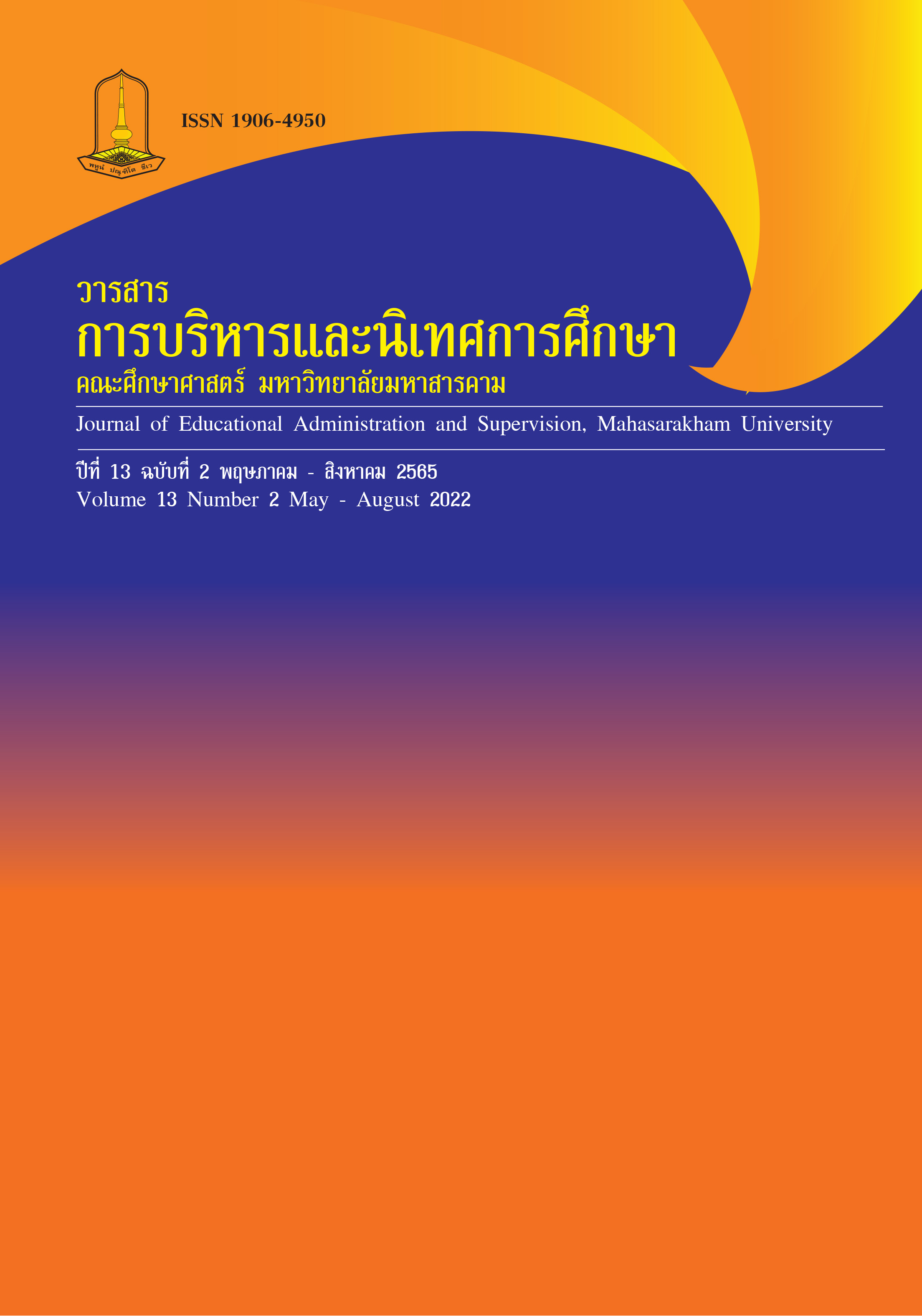Transformational Leadership of School Adminstrators Affecting Learning Organization in School Under Roi-Et Primary Educational Service Area Office 2
Main Article Content
Abstract
The objective of this research were to: 1) study transformational leadershipof school administrators under Roi Et primary educational service area office 2,2) study learning organization of schools under Roi Et primary educational service area office
2, 3) study the relationship between transformational leadership of school administratorsand learning organization in schools under Roi Et primary educational service area office 2and 4) study transformational leadership of School administrators affecting learning
organization in Schools under Roi Et primary educational service area office 2. The sampleswere 336 school administrators and teachers in Roi Et primary educational service areaoffice 2, divided into 38 school administrators and 298 teachers. The research instrumentused for data collection was a five rating scales questionnaire with reliabilities of Cronbach’s
alpha coefficient were part 1: Transformational leadership of school administrators= 0.983and part 2: Learning organization in schools= 0.974. The statistical techniques employedin data analysis were percentage, mean, standard deviation and Pearson Product MomentCorrelation Coefficient. Regression equations were created for predicting dependentvariables through Stepwise Multiple Regression analysis.The research findings were as follows:1. Transformational leadership of school administrators in overall and each aspectwere at a high level.2. Learning organization in schools in overall and each aspect were at a high level.3. The relationship of transformational leadership of school administrators andlearning organization of schools in overall the relationship was positive (rxy = 0.877) at the.01 level of significance.4. Transformational leadership of school administrators affecting learning organization
in schools under Roi Et primary educational service area office 2 consisted of 4 aspects:inspiring (X4), the aspect of having an ideological influence (X2), the intellectual stimulation(X1), and reward side (X5). The five variables predicted the variance of learning organizationof schools. It could predict 78.60% at the .01 level of significance. The prediction equationscould be written as follow:The regressive equation in the form of raw score (Unstandardized Score)Y´ = .117 + .304X4 + .242X2 + .265X1 + .281X5The regressive equation in the form of standard score (Standardized Score)Z´y = .283ZX4 + .247ZX2 + .288ZX1 + .274ZX5
Downloads
Article Details
References
พิพัฒน์พงศ์ หมวกไธสง. (2559). ความสัมพันธ์ระหว่างภาวะผู้นำการเปลี่ยนแปลงของผู้บริหารสถานศึกษากับความเป็นองค์กรแห่งการเรียนรู้ของโรงเรียน ในสังกัดสำนักงานเขตพื้นที่การศึกษาประถมศึกษาบุรีรัมย์ เขต 4. วิทยานิพนธ์ปริญญาครุศาสตร์มหาบัณฑิต บัณฑิตวิทยาลัยมหาวิทยาลัยราชภัฏบุรีรัมย์.
ภัทรพล ไหลไพบูลย์. (2554). องค์กรแห่งการเรียนรู้ของโรงเรียนพานทองสภาชนูปถัมภ์ สังกัดสำนักงานเขต พื้นที่การศึกษามัธยมศึกษา เขต 18. วิทยานิพนธ์การศึกษามหาบัณฑิต สาขาวิชาการบริหารการศึกษา มหาวิทยาลัยบูรพา.
สำนักงานคณะกรรมการการศึกษาขั้นพื้นฐาน. (2552). คู่มือดำเนินการพัฒนาหลักสูตรการพัฒนา ผู้นำการเปลี่ยนแปลงเพื่อรองรับการกระจายอำนาจสำหรับครูและศึกษานิเทศก์. กรุงเทพฯ: สำนักพิมพ์์คณะรัฐมนตรีและราชกิจจานุเบกษา
สำนักงานเขตพื้นที่การศึกษาประถมศึกษาร้อยเอ็ดเขต 2. (2564). แผนปฏิบัติการประจำปี: สำนักงาน
เขตพื้นที่การศึกษาประถมศึกษาร้อยเอ็ดเขต 2.
อรสา จรูญธรรม. (2563). รูปแบบความสัมพันธ์เชิงสาเหตุของปัจจัยที่ส่งผลต่อการเป็นองค์กรแห่งการเรียนรู้ในสถานศึกษา สังกัดสำนักงานเขตพื้นที่การศึกษาประถมศึกษาพระนครศรีอยุธยา.วิทยานิพนธ์ ค.ม. (การบริหารการศึกษา). ปทุมธานี: บัณฑิตวิทยาลัย มหาวิทยาลัยราชภัฎวไลยอลงกรณ์ ในพระบรมราชนูปถัมภ์.
อาซีซ๊ะ ยีหะมะ. (2560). ภาวะผู้นำการเปลี่ยนแปลงของผู้บริหารสถานศึกษาในโรงเรียน ศูนย์เครือข่ายธารามิตร สำนักงานเขตพื้นที่การศึกพาประถมศึกษาปัดตานีเขต 1. วิทยานิพนธ์ ค.ม. (การบริหารการศึกษา). ยะลา: บัณฑิตวิทยาลัย มหาวิทยาลัยราชภัฎยะลา.
Barling, J., Weber, Tom. & Kelloway, E. Kevin. (1996). Effects of Transformational LeadershipTraining on Attitudinal and Financial Outcomes. Journal of Applied Psychology, 81(6).
Bass, Bernard M. (1997). Does the Transactional-Transformational Leadership ParadigmTranscend Organizational and National Boundaries. American Psychologist.
Bass, Bernard M. & Riggio, Ronald E. (2006). Transformational Leadership. (2nd ed).New Jersey: Lawrence Erlbaum Associates.
Hay Acquisition Company I, Inc (2002). The organizational climate dimensions. (14th ed.).Boston: McBer and Company.
Hoy, W.K. and Miskel, C.G. (2001). Educational Administrations Theory Research andPractice. 6th ed. New York: McGraw-Hill.
Leithwood, K. and Jantzi, D.(1996). “Toward an Explanation of Variation in Teacher’Perceptions of Transformational School Leadership. Educational AdministrationQuarterly, 32(5), 510-538.
Marquardt, M and Reynolds A. (1994). The Global Learning Organization. New York: IRWIN.


